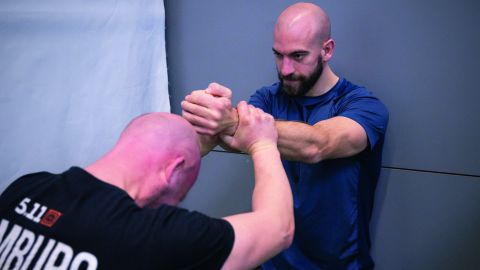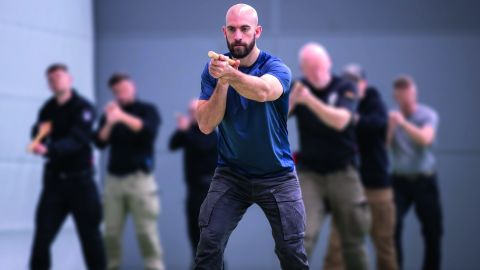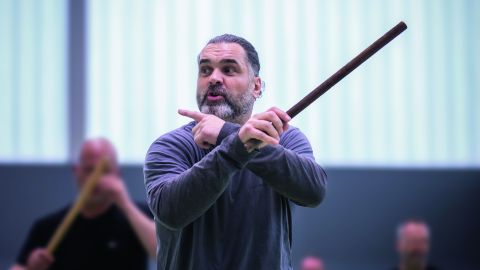A few months have passed since then, but Andreas S. can still reel off his text as if it were yesterday: "Welcome to Germany, Mr. President ...!" In fluent English, he had explained to Volodymyr Selensky that he would now escort him via the NATO airbase to the helicopter that was to fly him to Aachen for the Charlemagne Prize ceremony. "That was my absolute highlight: being allowed to protect the most endangered person in the world!" he says.
Andreas S. is a bodyguard with the NRW police - and a trained professional: strong nerves, confident with a firearm and prepared to put his own life on the line in an emergency. But romanticizing associations à la "Bodyguard" and Kevin Costner are out of place. Normally, it is about protecting people in political life, prime ministers, ministers, but also people from the center of society or those who testify as witnesses in court proceedings. It's often about terrorism, organized crime and the clan or rocker milieu.
A random Monday in autumnal, rainy Selm-Bork. Around 40 bodyguards from all over Germany are meeting here at the State Office for Training, Further Education and Personnel Matters of the NRW Police (LAFP) for an unusual training seminar. It is about drone defence with high-tech equipment and tactical intervention techniques, about recognizing potential assassins in advance of a crime and identifying them in good time. And Sascha B., the expert from the State Office for Central Police Services (LZPD NRW), is actually somewhat reminiscent of "Q", the head of the development department in James Bond films, when presenting the latest technology.
Many interesting technical possibilities are presented to the bodyguards so that they are optimally equipped for missions such as the G20 summit and can ensure the safety of high-profile participants.
The seminar participants are fascinated by the technical possibilities of drone defense. Some of the devices he presented, explains Sascha B., have already been purchased, while others are still on his "wish list".
The 39-year-old Dominik L. completed a traditional police career before becoming a bodyguard. He first completed a dual course of study for the higher civil service at the University of Applied Sciences for Police and Public Administration, followed by five years of guard duty in the Ennepe-Ruhr district. He found out about the job of bodyguard by chance when a colleague drew his attention to a nationwide job advertisement. Dominik L. applied spontaneously, met the strict criteria and, after completing introductory training, started working as a bodyguard at Dortmund police headquarters. Today, he is the course leader responsible for the demanding qualification of bodyguards in the NRW police force.
Instead of everyday crimes, he now mainly dealt with witness protection appointments relating to organized crime. Rockers, clan milieu, Islamist scene. "Just like in the movie, you are responsible for ensuring that those who testify as victims or witnesses in court are not put in danger. It's about dropouts from the scene or clan members who come clean and incriminate others," explains Dominik L.
His colleague Robin F. (34) is in charge of a permanent protection officer at Düsseldorf police headquarters. "I also accompany the person in need of protection to professional appointments in particular, so I get to experience an interesting world with lots of political and social appointments," says Robin F. He had previously worked for a specialized personal protection unit of the Federal Criminal Police Office in Berlin. Iraq, Mali, Chad. One week here, then back there again. "A year earlier, I had been recording traffic accidents in Essen, and suddenly I was on a plane with the then Minister of Defense von der Leyen. The most exciting thing, however, is traveling with the members of the Bundestag committees."
Personnel protection is teamwork. Being able to rely absolutely on your colleagues. Understanding each other wordlessly. High concentration and precision. Because any mistake could be fatal in an emergency. The 8-hour day can sometimes turn into a round-the-clock operation. "And there are days when I don't know in the evening where I'll be the next morning," says Robin F. A job that demands a lot. "You have to see the advantages. The job is interesting, you experience a lot and work very independently. There is no traditional night shift, but there is a lot of training, a lot of sport and a lot of training," explains F.
The federal police officer has now taken over "Calzone" in room C 6 of the Selm-Bork LAFP. Calzone, the name by which he would like to be addressed, worked for 13 years in a command of the PSA (Police Protection Tasks Abroad) of the Federal Police and is currently a member of the First International Task Force. A special forces trainer with a lot of international experience. He has brought along videos of suicide attacks in Kabul, Afghanistan, and reports from the trial files on conspicuous features shortly before the assassination attempt on the then leading SPD candidate Oskar Lafontaine in 1990. His topic this afternoon: "Behavior of assassins in the pre-crime phase".
And Calzone will not only report, he will also stage an attack on himself with distributed roles. A fake attack. The seminar participants now become unsuspecting listeners, unruly troublemakers, observers, bodyguards who are supposed to save him from the ominous assassin with the acid syringe. Only Calzone himself knows who is who and who has taken on which job. Everyone is watching everyone else. Who might be the perpetrator? Who is behaving differently, somehow conspicuously? In the end, there are two who do their job well, intervene in time and overpower the "culprit".
Calzone begins the investigation. Who saw what? Who thought who or what was suspicious? Was there anything unusual? The "perpetrator" himself reports how nervous he was before the crime, how he could feel his heart beating faster and placed his cell phone on the table in front of him so that he could keep an eye on the time, the intended moment of the crime, inconspicuously. Calzone sums up: "My aim is to sensitize you. There are indications of an imminent crime. Posture. Facial expressions. Movement. And it always takes several officers who are fully focused on their target. We need to listen more to our instincts and take our gut feeling seriously. If you see something, say something! Say what is!"
Personal protection is not something the police talk about in public. It's about security, but also about discretion. Anyone who has been responsible for protecting a federal president or a prime minister for years knows how the person to be protected lives, what their everyday life looks like. They need a high level of social competence and are obliged to remain silent. Just as there is no official data on the total number of bodyguards in Germany.
In an emergency, bodyguards are required to have above-average fitness levels. Among other things, they must be able to evacuate people who are unable to move and still remain receptive. "It's really demanding," says Robin F. The ability to perform must therefore be proven every year, regardless of age and gender. "Health and fitness are real basic requirements for this. That's expected of us all."
He also knows that there is no alternative to discretion. At parties, he sometimes pretends to be a fitness trainer or a paramedic. He prefers this legend to being pestered with questions about his job. But Robin F. and his colleagues have a lot to tell. The tactical standards for deployment and further training of the NRW personal protection units are currently being further developed. "In 2022, we took first place in the nationwide comparison competition. Now it's time: Anyone who stops getting better has stopped being good," says Dominik L. He is delighted to be able to train future generations in this exciting field of operation centrally at the LAFP. After all, his mission is to turn good police officers into good bodyguards.


